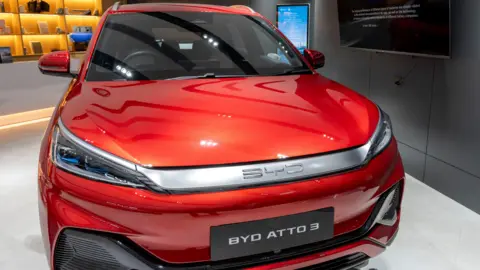In a compelling legal development resonating profoundly within the global automobile sector, Brazilian prosecutors have launched a lawsuit against BYD, a prominent Chinese electric vehicle (EV) manufacturer, alongside two of its contractors. The basis of this lawsuit stems from allegations surrounding severe labor exploitations and violations of human rights. Prosecutors assert that these companies contributed to human trafficking and operated under conditions that the Brazilian legal system describes as “analogous to slavery” at a construction site for a factory in the Bahia region of Brazil.
The Public Labour Prosecutor’s Office (MPT) of Bahia initiated this legal action following an anonymous tip-off that prompted an investigation into the labor conditions at the site. Consequently, the MPT revealed that approximately 220 Chinese workers were rescued, highlighting serious welfare and human rights violations at the construction location. The legal pursuit seeks to recover 257 million Brazilian reais, equating to roughly $45.5 million or £33.7 million, from the implicated firms as damages for the represented labor injustices.
While BYD has not yet released an official response to this specific lawsuit from Brazilian authorities, the company has previously maintained a stance of “zero tolerance for violations of human rights and labor laws.” The firm, which is referred to as ‘Build Your Dreams,’ has a significant footprint in the electric vehicle market and is keen on expanding its operations in Brazil.
The allegations presented by the MPT are particularly stark. They assert that construction activities for the plant were halted late last year when it was discovered that laborers were living under deplorable conditions. Reports indicated that accommodations were cramped, providing “minimum comfort and hygiene conditions.” Some workers were noted to have slept on beds devoid of mattresses, and astonishingly, a single toilet facility was reportedly shared by 31 individuals.
Moreover, the MPT’s findings revealed troubling employment practices, including the confiscation of workers’ passports and the imposition of illegal clauses within employment contracts. These arrangements often resulted in excessively long working hours without any designated breaks for rest. The investigation further uncovered a shocking practice where workers had as much as 70% of their salaries withheld, complicating the pathway for those wishing to terminate their contracts, often incurring exorbitant costs in the process.
In Brazilian legal terminology, “slavery-like conditions” encompass various forms of labor exploitation, including debt bondage and employment situations that fundamentally violate human dignity. These definitions underline the gravity of the situation at hand and bring to light significant concerns about labor rights within the international business context.
The construction site in question is located in Camacari, a city in northeastern Brazil, where BYD was poised to establish its first EV manufacturing plant outside of Asia. The factory was initially projected to be operational by March 2025, representing a significant milestone for BYD’s ambitions to tap into the burgeoning Brazilian electric vehicle market. Brazil stands as BYD’s largest overseas market, a fact further emphasized by the company’s prior establishment of a factory in São Paulo in 2015, dedicated to producing chassis for electric buses.
In recent developments in the EV landscape, BYD has emerged as a significant competitor, even surpassing Tesla in vehicle sales across Europe during April 2023, according to research conducted by car industry analytics firm Jato Dynamics. Such achievements underscore BYD’s strong market positioning and the importance of addressing any allegations that could tarnish its reputation and operational legitimacy, particularly in diverse markets like Brazil.
As the lawsuit progresses through the legal framework, it bears a broader significance, reflecting ongoing global discussions about labor rights, corporate accountability, and ethical practices within supply chains. The outcome of this case will not only impact the involved parties but could also reverberate throughout the entire automobile industry, especially as electric vehicles become increasingly central to discussions around sustainable practices and corporate responsibility.











